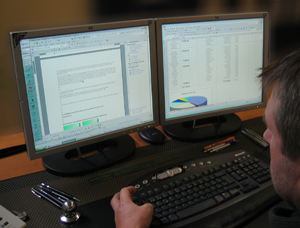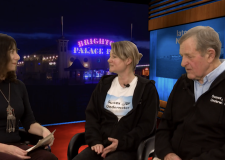News: Trusting people with information
A collaboration between four Brighton & Hove organisations aims to help people to use official information for all our benefit. Frank le Duc reports
Tom Smith deals with data. Vast quantities of it. From the census to the budget, from unemployment statistics to the number of council houses or school places or hospital beds available in Britain. And he aims to ensure that when someone searches for information on the internet, they find it in a format that is relevant, readable and useful.

Dr Smith is the director of a Brighton organisation called OCSI – or the Oxford Consultants for Social Inclusion. OCSI is a spin-out research consultancy from the Social Disadvantage Research Centre at Oxford University. In Brighton and Hove it has teamed up with the Democratic Society (DemSoc) and Public-i to help the public become better informed. Latest is working with them as their media partner.
Dr Smith said: “We want to inform public discussions about local services with better data. There’s lots of information out there. Lots of it is in raw formats. Machines can read it but people can’t. We’re about making it readable, making it useable and enabling people to hold public sector organisations to account.

“We’re collecting huge databases and we’re making widgets – technical tools – to help people make sense of it all. Some of it is about data visualisation – maps, graphs and charts.” He said that, with accurate information, people would be better placed to participate in the decisions that affect their lives. Numberhood is one app that OCSI has developed. Another, Community Insight, has proved popular with housing associations.
Public and private sector organisations make use of the data collected by OCSI, which is based at Brighton Junction in the New England Quarter, close to Latest’s offices. Some pay for access which helps fund OCSI’s work. The project with Latest, Public-i, which is based in Hove, and Brighton-based DemSoc is being supported by the government’s Technology Strategy Board.
Work on the project is taking place against the backdrop of the month-long Brighton Digital Festival, which runs throughout September. And in a climate where increasing amounts of raw data are being published, often in formats which are hard for most of us to understand, Brighton and Hove City Council has recently committed to increasing the volume of information that it makes public.
The council leader Jason Kitcat has worked as a specialist in this field and is only too aware that it costs little to publish data online. But as he searches for savings of about £20 million, he knows that commercial organisations will be scouring the data, trying to work out if they can undercut current service providers.
It’s not just about saving money. Dr Smith said that it was also about helping public bodies to make better decisions – and decisions that have had more input and garnered more support from those affected by them. His team are trying to “develop and interpret the evidence base to help the public sector and other organisations deliver better services”.
Over the past ten years OCSI has been “committed to improving social and economic outcomes by providing high-quality rigorous research and analysis that meets the needs of our users”. It’s not just about trying to improve policy-making but also service delivery. DemSoc and Public-i also have a track record of trying to use the latest technology and social media to increase public participation in democracy.
And the council website says: “Open data is about increasing transparency in government. It’s also about sharing the information we hold with the wider community to build useful applications.” It’s still early days. But Brighton and Hove is leading the way in some aspects of open data and the ways that it can be used to help the people who live, work and visit here.
More information at:
www.ocsi.co.uk
www.demsoc.org
www.brighton-hove.gov.uk/opendata
www.public-i.info





















